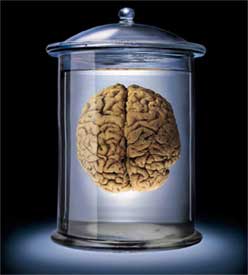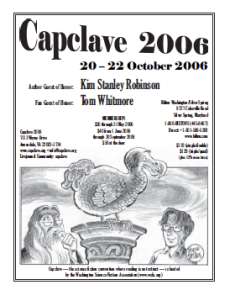Since John Scalzi has already gotten the ball rolling by pointedly mentioning that his novels The Ghost Brigades and The Android’s Dream are eligible for the Hugo Award this year, I’m going to follow suit by pointedly mentioning that I, David Louis Edelman, am eligible for the John W. Campbell Best New Writer Award.
So I hereby declare with all requisite humility that I would like to get nominated for the John W. Campbell Award this year, so I can get my ass handed to me forthwith by Brandon Sanderson, who will probably win.
 (My book Infoquake is eligible for the Hugo and the Nebula, too, of course, but I’m not holding my breath. Instead I’m going to go the Peter Jackson route and try to sweep every award in existence when Geosynchron, the last book in the trilogy, comes out. I really think I deserve a Tony Award, don’t you?)
(My book Infoquake is eligible for the Hugo and the Nebula, too, of course, but I’m not holding my breath. Instead I’m going to go the Peter Jackson route and try to sweep every award in existence when Geosynchron, the last book in the trilogy, comes out. I really think I deserve a Tony Award, don’t you?)
So how do you nominate someone for the John W. Campbell Best New Writer Award? I really have only the foggiest idea. But here’s what the Writertopia site says on its John W. Campbell Eligible Authors page:
To be able to nominate a writer for the 2007 award, you must have either been an attending member of the 2006 Worldcon in Los Angeles or be a supporting or attending member of the 2007 Worldcon in Japan by Jan. 31, 2007.
The nominating deadline will probably be March 2007. We will update the site as more information becomes available.
To be able to vote for the award, you must be a supporting or attending member of the 2007 Worldcon. If you are not a member of the Nippon 2007 Worldcon and wish to vote, you must purchase a supporting membership or an attending membership before January 31.
This should prove to be an interesting year for the awards regardless, given that the only eligible voters are those who are traveling to Japan for Worldcon, or who have purchased a supporting membership. If I were an optimist, I could say this works to my advantage, because theoretically the pool of voters will be somewhat skewed from the normal representation. On the other hand, the fact that Infoquake isn’t available at all in Asia except by mail order does put a dent in that optimism.
If you browse through the list of eligible authors, you’ll see that there’s quite an impressive list of newcomers there as well. The Writertopia folks haven’t updated the page with the final eligible list yet, so I’m unclear who’s still eligible and who’s not. It would kind of be nice to have a succinct list by, say, January 31. But I’m on there myself, so I can’t complain.
This will be Brandon Sanderson‘s second year of eligibility for the award, so I wouldn’t be at all surprised if he won it. I got a brief opportunity to meet Brandon at last year’s Worldcon, and he certainly seemed like a nice guy. Orson Scott Card called his debut novel Elantris “the finest novel of fantasy to be written in many years,” and plenty of other reviewers have followed suit. His follow-up Mistborn has been receiving a ton of accolades as well.
 Mind uploading is a transhumanist concept wherein you take a human brain and digitize it. We’re not just talking about scanning and mapping here; the goal is to have a fully functioning mind that can exist outside of all this defective muscle, bone, and tissue you cart around with you. Science fiction authors have been kicking the idea around forever. Wikipedia cites Philip K. Dick and Roger Zelazny as some of the earliest SFnal treatments of mind uploading, but you could make a good argument that Mary Shelley got there first with her Frankenstein, or the Modern Prometheus in 1818.
Mind uploading is a transhumanist concept wherein you take a human brain and digitize it. We’re not just talking about scanning and mapping here; the goal is to have a fully functioning mind that can exist outside of all this defective muscle, bone, and tissue you cart around with you. Science fiction authors have been kicking the idea around forever. Wikipedia cites Philip K. Dick and Roger Zelazny as some of the earliest SFnal treatments of mind uploading, but you could make a good argument that Mary Shelley got there first with her Frankenstein, or the Modern Prometheus in 1818. By this standard,
By this standard,